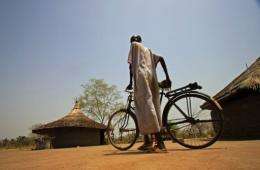Sudan looks to the sun for power

Spread across central Africa as the continent's largest country, Sudan plans to exploit the relentless Saharan sun to power its underdeveloped regions and green its deserts.
Harnessing the sun's energy for vast regions such as war-torn Darfur, which itself is the size of France, is costly. But the country's ministry of energy and mining believes that advances in solar technology will lower the costs.
"The costs are high compared to other conventional energy resources but we think that with the technology advances going on there will be a substantial decrease," the ministry's secretary general, Omar Mohammed Kheir, told AFP.
The plan, he said, was to develop solar energy in regions not linked to the national grid, such as North Darfur.
By harnessing clean solar power impoverished Sudan could be setting a global example in a world worried about climate change.
As the world observes Earth Hour on Saturday, global landmarks from Sydney's Opera House to the Forbidden City, to the glittering Las Vegas Strip, will be plunged into darkness as activists bid to reinvigorate the climate change fight.
Hundreds of millions of homes, in scores of cities scattered around 125 countries will also join the great Earth Hour switch-off, creating a wave of darkness that will roll across the world.
Sudan is the continent's fifth largest oil producer -- three fifths of its product is exported to Asia -- and is multiplying its hydroelectric projects along the Nile.
But conventional energy sources alone will not meet the increasing demand of this country of 40 million people.
Earlier this month, the French company Solar Euromed signed an agreement with Sudan to build and run solar power plants over the next decade.
"Our country is developing very, very fast and we think there is a need for more electricity. That is why we have a master plan to generate about 20.000 megawatts within the coming 20 years," Kheir said.
"The hydro power may contribute to 20 to 25 percent at maximum. The rest will come from other sources, all renewable energy including biofuel, solar energy, gas and maybe even nuclear energy."
Sudan has already launched a plant to produce biofuels, with a target of two million litres (528,000 gallons) in two years.
Marc Benmarraze, chairman of Solar Euromed, said Sudan was well placed to use solar energy, but he cautioned over the country's conflict-ridden history.
"Sudan is in the zone known as the solar belt, where there is a direct normal radiation that is one of the world's strongest," Benmarraze said.
The company's first project will produce at least 150 megawatts with up to a third generated by solar power.
The agreement, though in its basic stages, could be a first step in ambitious plans to green the deserts in northern Sudan and North Darfur.
"In this region, desertification has happened," said Osama Rayis with the African City of Technology, which is linked to the ministry of technology.
"So our idea is turning yellow to green, through the use of solar energy for pumping because there is a lot of underground water in all these areas, so we can change the picture dramatically," he said.
"It is very difficult to use fossil-based energy there because transportation is a problem," he said.
But costs stand in the way.
"Our problem is the lack of funds. So we are trying to work it out," he said. "We are trying to market these projects for the parties, the government, the international community, NGOs."
The Sudanese government is not financing solar Euromed's 10-billion-dollar project. The company, which is eying two projects in Darfur, wants to finance it with partners and make a profit by selling the energy.
The Solar Euromed deal is a "preliminary memorandum of understanding," said Kheir.
Investing in the conflict ridden country, which went from a two-decade civil war between the north and the south to a devastating war in Darfur, is risky.
Sudan "has its own political risks," said Benmarraze, adding it was necessary to take it "step by step" rather than try to secure the full 10-billion needed for the project.
Ulrich Mans, a renewable energy specialist at Amsterdam University visiting Sudan for research, said it was necessary to show that the technology would work in the country to gain investors' confidence.
"In order to get significant investors on board it is crucial to show that this technology makes economic sense and offers returns on investment to foreign companies," he added.
(c) 2010 AFP

















